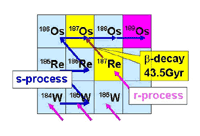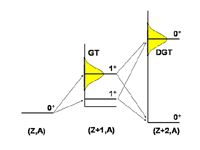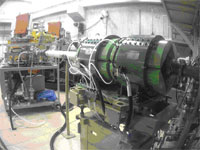Research Center for Nuclear Physics (RCNP), Osaka University
Origin of matter and evolution of the universe are central themes of fundamental physics and astronomy. Nucleosynthesis provides a unique opportunity to solve those problems. RCNP nuclear astrophysics group is studying experimantally the reactions of elementary particles and atomic nuclei which are relevant to nucleosynthesis in the early universe and in stars. Current themes of our research are as follows.
Nuclear reactions occurring in stars contribute not only to generation of stellar energies but also to production of various elements from hydrogen and helium. Therefore information on the stellar nuclear reactions are useful to investigate lives of the stars and processes of stellar nucleosynthesis. We are studying nuclear reactions induced mainly by neutrons and ¿-particles, which are relevant to stellar nucleosynthesis, by means of laboratory experiments.
Long-lived radioactive nuclei like 187Re (T1/2 = 4.35~1010 years), 232Th (T1/2 = 1.41~1010 years), 238U (T1/2 = 4.5~109 years) observed in cosmogenic samples can be utilized for dating the stars which produced them. Therefore those nuclei can serve as gnuclear cosmochronometersh of the stars, which are also useful to investigate the history of galaxy formations. We are studying nuclear reactions concerning the isotopes which can be used as nuclear chronometers.
Property of the neutrinos is an important issue of particle physics and is concerned with the big bang cosmology and mechanisms of supernova explosions. Existence of nonvanishing masses of neutrinos has been confirmed by various experiments such as Super-Kamiokande, SNO, and KamLAND, but absolute values of the masses are still unidentified. The neutrino-less double beta decay is a process with extremely high sensitivity to absolute masses and Mayorana character of the neutrinos, and can be studied precisely by means of the double-charge exchange nuclear reactions.
High-energy astrophysical processes like supernovae, Á-ray bursts, cosmic-ray-induced spallation reactions are considered to produce various kinds of unstable nuclei whose chemical properties are unknown. By using the method of nuclear chemistry, we are studying chemical properties of atoms consisting of unstable nuclei, which are produced by means of the RCNP ring cyclotron. Those informations are useful to investigate high-energy processes of astrophysical nucleosynthesis.
 |
 |
 |